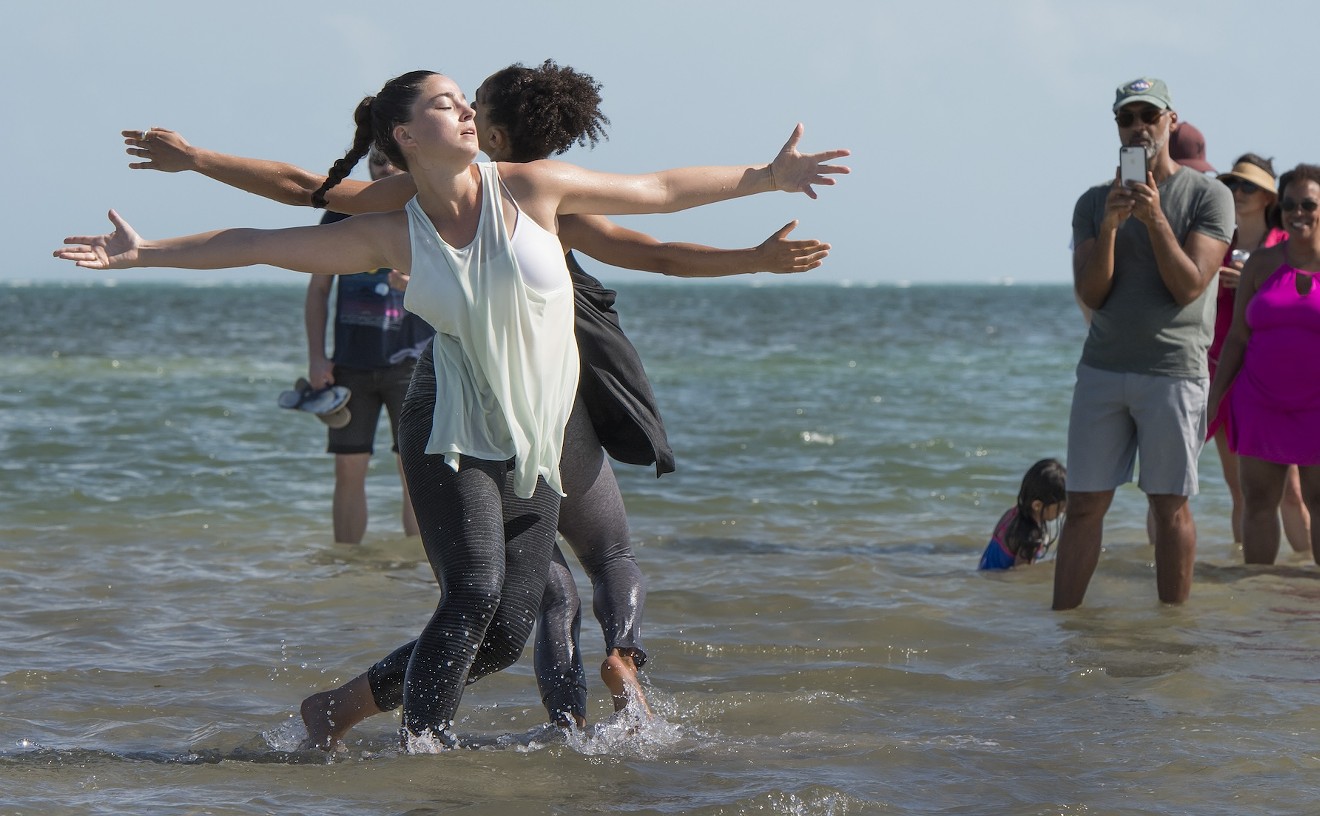This week in South Beach, artists and guests will take part in an interactive artistic and philosophical expression in the Reading Queer Series, which aims to inaugurate Miami as a center of queer literary culture.
The series kicked off at the Betsy Hotel in South Beach last Saturday, and continues with the artist group Digital Hostage Collective's Cruising Hialeah or Ghosts of Public Sex tonight from 7 to 9 p.m. in the Miami Beach Botanical Gardens.
See also: Former Miami Herald Reporter Reveals Gay Escapade in Havana
Five years ago, Miami poets Neil de la Flor, Maureen Seaton, and Paula Kolek began to create the series as a way to contribute another aspect to queer culture. Inspired by the poetry movement of O, Miami and Miami Poetry Fest, organizers saw an opportunity to not only further the present queer literary landscape, but to inspire the Miami community to imagine what it is to be queer in the future, according to program director José A. Villar-Portela. He says the queer community is hungry for social and intellectual stimulation not found in typical gay bar culture.
"It's not about serving what is, but imagining what isn't," Villar-Portela said. "We're interested in creating a queer community that is aware of the world around it.... Queer people need to have a place to gather outside a bar and to engage ideas and works of art that are critical and creative instead of escapist.
"It's been an incredible and unbelievable thing... People have a stake in what's happening, and that stake is born out of the need of creating a community around queer literature and art and people are hungry for that."
The series is not just for queers, however. Queerness is about inclusiveness, Villar-Portela says. It's not necessarily just about a person's sexuality; it's about not denying real differences.
"Queer art can be art that is experimental, complicated, anti-patriarchal; not 'who the author is doing, but what the text is doing -- real queer literature has a bigger scale," he said. "The queerness is the potential to create beyond what is allowed, be as weird as one wants to be, and fly your freak flag."
The Digital Hostage Collective is a group of artists and collaborators, including singer Celeste Delgado and videographer Damian Rojo, whose purpose is to comment on ways in which our lives are connected to technology, and in some cases held hostage by it. The group uses different technological media for its art, and in this case connects the idea of "cruising" -- the gay cultural term referring to hook-ups in dark rooms or tea houses -- to cruising via digital dating and hook-ups arranged online.
The Digital Hostage Collective will host an interactive presentation Wednesday in commemoration of the late José Esteban Muñoz, a renowned gay academic and writer who was born in Havana and raised in Hialeah.
"José Muñoz was a man of Miami," Delgado said of her friend. "His intellectual contribution to the queer movement and philosophy is something Miami can be proud of."
When Muñoz died, a memorial was organized in Miami with queer artists and writers who went cruising on a boat, which was a reference to Muñoz's book, "Cruising Utopia." It was at this memorial that Delgado and Reading Queer founder Neil de la Flor noticed the guests' interest in sections of Muñoz's book, particularly about the gay bar sex rooms, and the utopian ideal of public sex without the fear of AIDS. It inspired Delgado to choose the chapter from his book "The ghost of public sex," as the title for their project.
"Cruisers," like dance theater provocateur Octavio Campos and choreographer Pioneer Winter, will interact with visitors, soliciting them to listen to oral histories of the queer Miami and Hialeah of the '80s while soprano Delgado and tenor José Vilanova roam the grounds and perform arias to evoke devastating impact of the AIDS pandemic with haunting arias.
The Botanical Garden's Butterfly Room will transformed by Rojo, who has created a symbolic "back room," where an installation culled from archival film and new video evokes what Muñoz called the "utopian longing" of the public sex scene in the '80s.
"It's going to be beautiful," Delgado said. "The volunteers were excited to do it -- straight women who experience freedom. "The freedom comes in the role-playing of the cruisers, and the women feel that because even though they can "pick up" people in real life, there's the challenge of name and reputation, so it's an experience to pretend to be a gay male cruising without such restrictions or concerns."
Rojo, who was also born in Cuba and grew up in Hialeah, will use videos he shot as a young man in addition to music and imagery layered and blended in provocative ways.
"It'll be entertaining and informative, it's very focused on queer, but it's also an art event," Rojo said. "There's going to be people singing arias in the garden, beautiful, dreary, mournful, joyful -- it'll be an experience anybody would be able to enjoy -- unless you're totally prude!"
The Series will follow up with poetry readings from journalist, scholar, and poet L. Lamar Wilson, from his award-winning book, Sacrilegion, at the headlining event Saturday, August 30, from 7 to 9 p.m. in the Miami Beach Botanical Gardens. All events are free and open to the public with a suggested donation of $20. Visit readingqueer.org.
-- Karyn Leverette
Follow Cultist on Facebook and Twitter @CultistMiami.










